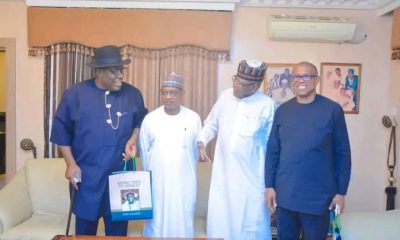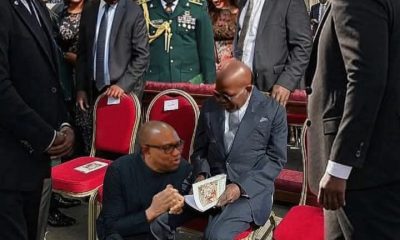EDUCATION
Senator Dickson Links Nigeria’s Insecurity Crisis To Decades Of Underinvestment In Education

Former Bayelsa State Governor and current Senator representing Bayelsa West, Henry Seriake Dickson, delivered a harsh assessment of Nigeria’s security challenges, arguing that the pervasive issues of militancy, banditry, and youth criminality are directly linked to a long history of insufficient investment in education.
Dickson made the announcement at the Forum of Nigeria Polytechnics Alumni Associations (FONPAA)’s Inaugural Public Lecture in Abuja.
Speaking with palpable passion on the lecture’s theme, “Tertiary Education in Nigeria: A Comparative Analysis of Funding, Policies, and Reforms in a Non-Democratic and Democratic Era,”
Senator Dickson urged all levels of government to take immediate and sustained action to address what he described as the most serious threat to national peace and development: inadequate education.
“If you want to assess how great a nation or a government is, do not look at the roads and bridges they build; look at what they do in education,” Dickson declared, challenging the traditional emphasis on physical infrastructure as a primary indicator of leadership effectiveness.
He contended that, while infrastructure projects are unquestionably important, they are frequently the easiest to initiate and carry out, lacking the visionary planning, long-term commitment, and sustained effort required to build a strong and equitable educational system.
Dickson warned that the roots of Nigeria’s persistent insecurity are not ethnic or religious differences, as is commonly assumed, but widespread deprivation of educational opportunities.
“When you trace it correctly, the root cause of our insecurity is a lack of adequate investment in education,” he said.
He emphasised the importance of creating a society in which citizens are not only educated, but also empowered and equipped with the critical thinking skills required to interact constructively with their surroundings, paving the way for a more peaceful and stable nation.
Drawing on his previous experience as Governor of Bayelsa State in 2012, Dickson described his first action upon taking office: declaring an educational state of emergency.
As a cornerstone of his administration, he established the Bayelsa Educational Development Trust Fund, a ground-breaking initiative in Nigeria. This fund, which is supported by public service levies and 5% of the state’s Internally Generated Revenue (IGR), was legally established to ensure continuity and sustainability after his tenure.
“I knew that in order for children in remote, water-bound villages to have a future, education needed to be made free, equitable, and mandatory. And it had to be adequately funded,” he explained, outlining his plan to combat insecurity by “democratising education” and making school accessible to even the most remote communities.
This policy was not just about building buildings; it was also about preparing future generations for success in a global knowledge-based economy.
Dickson emphasised that education is the only investment that does not depreciate. “If we do not provide our people with knowledge and skills, we will exclude them from the future.”
He warned that failing to prioritise education would perpetuate a cycle of marginalisation and resentment, exacerbating existing insecurity.
He went on to explain his administration’s strategy, which included decisive law enforcement actions against cultism, militancy, and kidnapping as well as long-term educational reforms.
“You fight crime not only by cracking down on it, but also by addressing the root causes. And the number one path to that is education,” he said, emphasising the complementary nature of these approaches.
The former governor emphasised that arresting criminals is a necessary but reactive measure. By addressing the root causes of crime through education, the state can proactively prevent future generations from repeating the same mistakes.
Senator Dickson calls on politicians to take action, challenging all elected officials to uphold their constitutional obligation to promote education as a fundamental democratic right.
“If you are not there to expand the frontiers of education and enable your people to realise their potential, then what are you there for?” he posed rhetorically, leaving the audience with a sobering reflection on education’s critical role in shaping Nigeria’s secure and prosperous future.
The senator’s remarks have reignited debate about Nigeria’s educational priorities, with many calling for a significant increase in budgetary allocation as well as a renewed emphasis on quality and accessibility.
The FONPAA event is expected to be followed by additional discussions and initiatives aimed at addressing the challenges facing Nigeria’s education system.
-
CRIME3 years ago
PSC Dismisses DCP Abba Kyari, To Be Prosecuted Over Alleged $1.1m Fraud
-
FEATURED3 years ago
2022 Will Brighten Possibility Of Osinbajo Presidency, Says TPP
-
FEATURED2 years ago
Buhari’s Ministers, CEOs Should Be Held Accountable Along With Emefiele, Says Timi Frank
-
BUSINESS & ECONOMY2 years ago
Oyedemi Reigns As 2023’s Real Estate Humanitarian Of The Year
-
SPORTS1 year ago
BREAKING: Jürgen Klopp Quits Liverpool As Manager At End Of Season
-
SPORTS2 years ago
Could Liverpool Afford Kylian Mbappe For €200 million? Wages, Transfer Fee
-
ENTERTAINMENT2 years ago
Veteran Nigerian Musician, Basil Akalonu Dies At 72
-
FEATURED2 years ago
Tribunal Judgement: Peter Obi Warns Of Vanishing Electoral Jurisprudence, Heads To Supreme Court
-
BUSINESS & ECONOMY2 years ago
Oyedemi Bags ‘Next Bulls Award’ As BusinessDay Celebrates Top 25 CEOs/ Business Leaders
-
FEATURED3 years ago
2023 Presidency: South East PDP Aspirants Unite, Demand Party Ticket For Zone


































